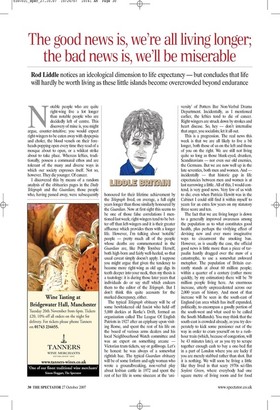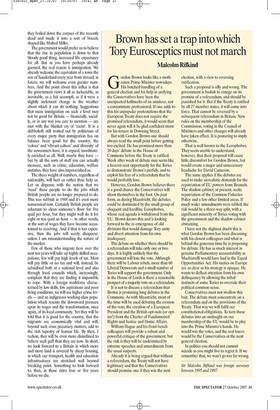The good news is, we're all living longer; the bad news is, we'll be miserable
Rod Liddle notices an ideological dimension to life expectancy — but concludes that life will hardly be worth living as these little islands become overcrowded beyond endurance Notable people who are quite right-wing live a lot longer than notable people who are decidedly left of centre. This discovery of mine is, you might argue, counter-intuitive; you would expect right-wingers to be eaten away with dyspepsia and choler, the blood vessels on their foreheads popping open every time they read of a mosque about to open, or a wildcat strike about to take place. Whereas lefties, traditionally, possess a communal ethos and are tolerant of the many and diverse ways in which our society expresses itself. Not so, however. They die younger. Of cancer.
I discovered this by means of a random analysis of the obituaries pages in the Daily Telegraph and the Guardian; those people who, having passed away, were subsequently honoured for their lifetime achievement by the Telegraph lived, on average, a full eight years longer than those similarly honoured by the Guardian. Now at first sight this seems to be one of those false correlations I mentioned last week; right-wingers tend to be better off than left-wingers and it is their greater affluence which provides them with a longer life. However, I'm talking about 'notable' people — pretty much all of the people whose deaths are commemorated in the Guardian are, like Polly Toynbee Herself, both high-born and fairly well-heeled, so that usual caveat simply doesn't apply. I suppose you might argue that given the tendency to become more right-wing as old age digs its teeth deeper into your neck, then my thesis is a tautology: it is during those later years that individuals do or say stuff which endears them to the editor of the Telegraph. But I don't think this quite accounts for the marked discrepancy, either.
The typical Telegraph obituary will be of some bewhiskered old fascist who held off 5,000 darkies at Rorke's Drift, formed an organisation called The League Of English Patriots in 1927 after an epiphany upon visiting Rome, and spent the rest of his life on the board of various arms dealers and his local Neighbourhood Watch committee and was an expert on something arcane — Victorian tram tickets, say or golliwogs. Let's be honest: he was always of a somewhat rightish hue. The typical Guardian obituary will be of some forlorn and ugly woman who wrote a groundbreaking, non-verbal play about lesbian cattle in 1972 and spent the rest of her life in some sinecure at the 'university' of Potters Bar Non-Verbal Drama Department. Incidentally, as I mentioned earlier, the lefties tend to die of cancer. Right-wingers are struck down by strokes and heart disease. So, hey — don't internalise that anger, you socialists; let it all out.
This is a pregression. The real news this week is that we are all likely to live a bit longer, both those of us on the left and those of you on the right. We are still not living quite so long as those blank-eyed, drunken, Scandinavians — nor even our old enemies, the Germans. But we are now well up in the late seventies, both men and women. And — incidentally — that historic gap in life expectancies between men and women is at last narrowing a little. All of this, I would contend, is very good news. Very few of us wish to die; even when Patricia Hewitt was in the Cabinet I could still find it within myself to yearn for an extra few years on my statutory three score and ten.
The fact that we are living longer is down to a generally improved awareness among the population as to what constitutes good health, plus perhaps the vivifying effect of devising new and ever more imaginative ways to circumvent the smoking ban. However, as is usually the case, the official good news is little more than a piece of tarpaulin hastily dragged over the maw of a catastrophe, to use a somewhat awkward metaphor. The population of Britain currently stands at about 60 million people; within a quarter of a century (rather more quickly, by my estimation) there will be 70 million people living here. An enormous increase, utterly unprecedented across our 2,000 years of history. And most of that increase will be seen in the south-east of England (an area which has itself expanded, politically, to encompass a goodly portion of the south-west and what used to be called the South Midlands). You may think that the south-east is crowded already, as you try desperately to kick some pensioner out of the way in order to cram yourself on to a rushhour train (which, because of congestion, will be 43 minutes late), or as you try to scrape together enough cash to buy a one-bed flat in a part of London where you are lucky if you are merely stabbed rather than shot. But it is nothing. We will soon be living a little like they lived in that scary 1970s sci-film Soylent Green, where everybody had one square metre of living room and for food they boiled down the corpses of the recently dead and made it into a sort of biscuit, shaped like Malted Milks.
The government would prefer us to believe that the rise in population is down to that bloody good thing, increased life expectancy for all. But as you have perhaps already guessed, the real reason is immigration. We already welcome the equivalent of a town the size of Sunderland every year from abroad; in future, we will welcome even greater numbers. And the point about this influx is that the government views it all as ineluctable, as inevitable, as a fait accompli, as if it were a slightly inclement change in the weather about which it can do nothing. Suggestions that mass immigration on such a level may not be good for Britain — financially, socially, or in any way you care to mention — are met with the blanket cry of 'racist'. It is a shibboleth still trotted out by politicians of every major party that immigration has on balance been good for the country; the 'colour' and 'vibrant culture' and 'diversity' of the newcomers have, it is argued, inordinately enriched us all. Well, maybe they have — but by all the sorts of stuff you can actually measure, such as crime, education, welfare statistics, they have also impoverished us.
The sheer weight of numbers, regardless of nationality, will hurt us rather than help us. Let us dispense with the notion that we 'need' these people to do the jobs which British people are no longer prepared to do. This was rubbish in 1948 and it's even more nonsensical now. Certainly British people are reluctant to clean someone's floor for five quid per hour, but they might well do it for eight or ten quid an hour — in other words, at the sort of wages they have become accustomed to receiving. And if that is too expensive, then the jobs will surely disappear, unless I am misunderstanding the nature of the market.
Few of those who migrate here over the next ten years will take up highly skilled occupations; few will pay high levels of tax. Most will pay little or no tax and will, instead, be subsidised both at a national level and also through local councils which, increasingly, complain that they are finding it impossible to cope. With a foreign workforce characterised by low skills, low aspirations and poor living conditions, we will see higher crime levels — and an indigenous working-class population which resents the downward pressure upon its wages and the transformation, once again, of its local community. Yet they will be told that it is good for the country, that the migrants are economically vital and will, beyond such crass pecuniary matters, add to the rich tapestry of human life. By then, I reckon, they will be even more disinclined to believe such guff than they are now. In short, we look forward to a Britain in which more and more land is covered by cheap housing, in which our transport, health and education infrastructures are stretched well beyond breaking point. Something to look forward to, then, in those extra four or five years before we die.



































































 Previous page
Previous page